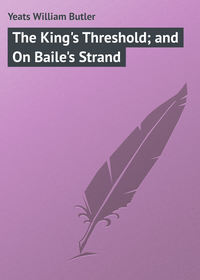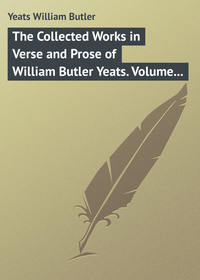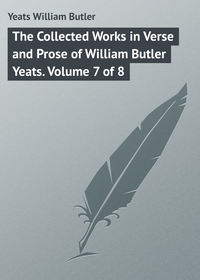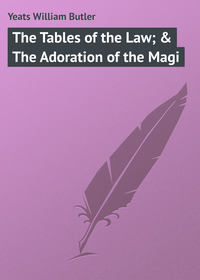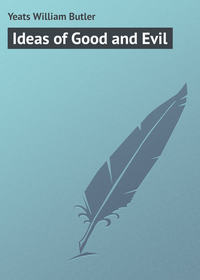 полная версия
полная версияJohn Sherman and Dhoya
Suddenly she saw him, and with a burst of wild laughter flung her arms around his neck, crying, “Dhoya, I have left my world far off. My people – on the floor of the lake they are dancing and singing, and on the islands of the lake; always happy, always young, always without change. I have left them for thee, Dhoya, for they cannot love. Only the changing, and moody, and angry, and weary can love. I am beautiful; love me, Dhoya. Do you hear me? I left the places where they dance, Dhoya, for thee!” For long she poured out a tide of words, he answering at first little, then more and more as she melted away the silence of so many inarticulate years; and all the while she gazed on him with eyes, no ardour could rob of the mild and mysterious melancholy that watches us from the eyes of animals – sign of unhuman reveries.
Many days passed over these strangely wedded ones. Sometimes when he asked her, “Do you love me?” she would answer, “I do not know, but I long for your love endlessly.” Often at twilight, returning from hunting, he would find her bending over a stream that flowed near to the cave, decking her hair with feathers and reddening her lips with the juice of a wild berry.
He was very happy secluded in that deep forest. Hearing the faint murmurs of the western sea, they seemed to have outlived change. But Change is everywhere, with the tides and the stars fastened to her wheel. Every blood drop in their lips, every cloud in the sky, every leaf in the world changed a little, while they brushed back their hair and kissed. All things change save only the fear of change. And yet for his hour Dhoya was happy and as full of dreams as an old man or an infant – for dreams wander nearest to the grave and the cradle.
Once, as he was returning home from hunting, by the northern edge of the lake, at the hour when the owls cry to each other, “It is time to be abroad,” and the last flutter of the wind has died away, leaving under every haunted island an image legible to the least hazel branch, there suddenly stood before him a slight figure, at the edge of the narrow sand-line, dark against the glowing water. Dhoya drew nearer. It was a man leaning on his spear-staff, on his head a small red cap. His spear was slender and tipped with shining metal; the spear of Dhoya of wood, one end pointed and hardened in the fire. The red-capped stranger silently raised that slender spear and thrust at Dhoya, who parried with his pointed staff.
For a long while they fought. The last vestige of sunset passed away and the stars came out. Underneath them the feet of Dhoya beat up the ground, but the feet of the other as he rushed hither and thither, matching his agility with the mortal’s mighty strength, made neither shadow nor footstep on the sands. Dhoya was wounded, and growing weary a little, when the other leaped away, and, crouching down by the water, began – “You have carried away by some spell unknown the most beautiful of our bands – you who have neither laughter nor singing. Restore her, Dhoya, and go free.” Dhoya answered him no word, and the other rose and again thrust at him with the spear. They fought to and fro upon the sands until the dawn touched with olive the distant sky, and then his anger fit, long absent, fell on Dhoya, and he closed with his enemy and threw him, and put his knee on his chest and his hands on his throat, and would have crushed all life out of him, when lo! he held beneath his knee no more than a bundle of reeds.
Nearing home in the early morning he heard the voice he loved, singing —
“Full moody is my love and sad,His moods bow low his sombre crest,I hold him dearer than the glad,And he shall slumber on my breast.“My love hath many an evil moodIll words for all things soft and fair,I hold him dearer than the good,My fingers feel his amber hair.“No tender wisdom floods the eyesThat watch me with their suppliant light —I hold him dearer than the wise,And for him make me wise and bright.”And when she saw him she cried, “An old mortal song heard floating from a tent of skin, as we rode, I and mine, through a camping-place at night.” From that day she was always either singing wild and melancholy songs or else watching him with that gaze of animal reverie.
Once he asked, “How old are you?”
“A thousand years, for I am young.”
“I am so little to you,” he went on, “and you are so much to me – dawn, and sunset, tranquility, and speech, and solitude.”
“Am I so much?” she said; “say it many times!” and her eyes seemed to brighten and her breast heaved with joy.
Often he would bring her the beautiful skins of animals, and she would walk to and fro on them, laughing to feel their softness under her feet. Sometimes she would pause and ask suddenly, “Will you weep for me when we have parted?” and he would answer, “I will die then;” and she would go on rubbing her feet to and fro in the soft skin.
And so Dhoya grew tranquil and gentle, and Change seemed still to have forgotten them, having so much on her hands. The stars rose and set watching them smiling together, and the tides ebbed and flowed, bringing mutability to all save them. But always everything changes, save only the fear of Change.
IIIOne evening as they sat in the inner portion of the cave, watching through the opening the paling of the sky and the darkening of the leaves, and counting the budding stars, Dhoya suddenly saw stand before him the dark outline of him he fought on the lake sand, and heard at the same instant his companion sigh.
The stranger approached a little, and said, “Dhoya we have fought heretofore, and now I have come to play chess against thee, for well thou knowest, dear to the perfect warrior after war is chess.”
“I know it,” answered Dhoya.
“And when we have played, Dhoya, we will name the stake.”
“Do not play,” whispered his companion at his side.
But Dhoya, being filled with his anger fit at the sight of his enemy, answered, “I will play, and I know well the stake you mean, and I name this for mine, that I may again have my knee on your chest and my hands on your throat, and that you will not again change into a bundle of wet reeds.” His companion lay down on a skin and began to cry a little.
Dhoya felt sure of winning. He had often played in his boyhood, before the time of his anger fits, with his masters of the galley; and besides, he could always return to his hands and his weapons once more.
Now the floor of the cave was of smooth, white sand, brought from the sea-shore in his great Fomorian pitcher, to make it soft for his beloved to walk upon; before it had been, as it now is, of rough clay. On this sand the red-capped stranger marked out with his spear-point a chess-board, and marked with rushes, crossed and recrossed each alternate square, fixing each end of the rush in the sand, until a complete board was finished of white and green squares, and then drew from a bag large chess-men of mingled wood and silver. Two or three would have made an armful for a child. Standing each at his end they began to play. The game did not last long. No matter how carefully Dhoya played, each move went against him. At last, leaping back from the board he cried, “I have lost!” The two spirits were standing together at the entrance. Dhoya seized his spear, but slowly the figures began to fade, first a star and then the leaves showed through their forms. Soon all had vanished away.
Then, realizing his loss, he threw himself on the ground, and rolling hither and thither, roared like a wild beast. All night long he lay on the ground, and all the next day till nightfall. He had crumbled his staff unconsciously between his fingers into small pieces, and now, full of dull rage, arose and went forth westward. In a ravine of the northern mountain he came on the tracks of wild horses. Soon one passed him fearlessly, knowing nothing of man. The pointed end of his staff he still carried. He drove it deep in the flank, making a long wound, sending the horse rushing with short screams down the mountain. Other horses passed him one by one, driven southward by a cold wind laden with mist, arisen in the night-time. Towards the end of the ravine stood one black and huge, the leader of the herd. Dhoya leaped on his back with a loud cry that sent a raven circling from the neighbouring cliff, and the horse, after vainly seeking to throw him, rushed off towards the north-west, over the heights of the mountains where the mists floated. The moon, clear sometimes of the flying clouds, from low down in the south-east, cast a pale and mutable light, making their shadow rise before them on the mists, as though they pursued some colossal demon, sombre on his black charger. Then leaving the heights they rushed wildly down that valley where, in far later times, Dermot hid in a deep cavern his Grania, and passed the stream where Muadhan, their savage servant, caught fish for them on a hook baited with a quicken berry. On over the plains, on northward, mile after mile, the wild gigantic horse leaping cliff and chasm in his terrible race; on until the mountains of what is now Donegal rose before them – over these among the clouds, driving rain blowing in their faces from the sea, Dhoya knowing not whither he went, or why he rode. On – the stones loosened by the hoofs rumbling down into the valleys – till far in the distance he saw the sea, a thousand feet below him; then, fixing his eyes thereon, and using the spear-point as a goad, he roused his black horse into redoubled speed, and with a wild leap horse and rider plunged headlong into the Western Sea.
Sometimes the cotters on the mountains of Donegal hear on windy nights a sudden sound of horses’ hoofs, and say to each other, “There goes Dhoya.” And at the same hour men say if any be abroad in the valleys they see a huge shadow rushing along the mountain.
THE END

